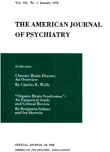Effects of Dextroamphetamine, Chlorpromazine, and Hydroxyzine on Behavior and Performance in Hyperactive Children
Abstract
In an eight-week double-blind study 61 hyperactive school-age boys were randomly assigned to chlorpromazine, dextroamphetamine, hydroxyzine, or placebo groups. Chlorpromazine and dextroamphetamine, virtually equally effective, were significantly more effective than hydroxyzine in modifying hyperactivity. Dextroamphetamine produced frequent side effects; chlorpromazine did not. The authors suggest that because response to the latter two drugs is highly individualized, final selection must depend upon clinical acumen and perhaps a trial of medication.
Access content
To read the fulltext, please use one of the options below to sign in or purchase access.- Personal login
- Institutional Login
- Sign in via OpenAthens
- Register for access
-
Please login/register if you wish to pair your device and check access availability.
Not a subscriber?
PsychiatryOnline subscription options offer access to the DSM-5 library, books, journals, CME, and patient resources. This all-in-one virtual library provides psychiatrists and mental health professionals with key resources for diagnosis, treatment, research, and professional development.
Need more help? PsychiatryOnline Customer Service may be reached by emailing [email protected] or by calling 800-368-5777 (in the U.S.) or 703-907-7322 (outside the U.S.).



